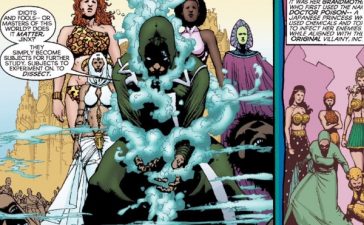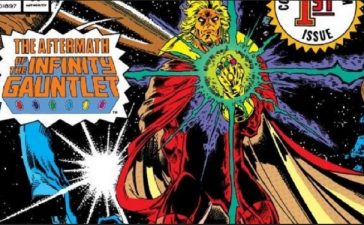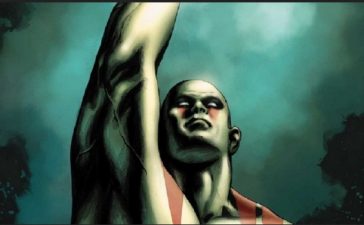
 Over the course of the last decade and a half, writer Joshua Dysart has worked on a variety of titles. He first emerged with the indie series Violent Messiahs, co-created with artist William O’Neil. Among the notable projects that followed were a two-year run on Swamp Thing, contributions to the Mignolaverse, and adapting Neil Young’s album Greendale into a graphic novel. His largest exposure to date came with his revamping of DC’s Unknown Soldier for Vertigo. Reimagining the character as a formerly pacifist doctor working in contemporary war-torn Uganda, Dysart delved deep into some of the darker corners of human nature. The result was a powerful character study without any easy answers, which received enthusiastic support from non-comics media, such as the New York Times. For the past two years, he has written Valiant’s Harbinger, currently one of the best titles on the stands. Recently, Dysart took the time to answer my questions about Harbinger, The Unknown Solider and his writing process.
Over the course of the last decade and a half, writer Joshua Dysart has worked on a variety of titles. He first emerged with the indie series Violent Messiahs, co-created with artist William O’Neil. Among the notable projects that followed were a two-year run on Swamp Thing, contributions to the Mignolaverse, and adapting Neil Young’s album Greendale into a graphic novel. His largest exposure to date came with his revamping of DC’s Unknown Soldier for Vertigo. Reimagining the character as a formerly pacifist doctor working in contemporary war-torn Uganda, Dysart delved deep into some of the darker corners of human nature. The result was a powerful character study without any easy answers, which received enthusiastic support from non-comics media, such as the New York Times. For the past two years, he has written Valiant’s Harbinger, currently one of the best titles on the stands. Recently, Dysart took the time to answer my questions about Harbinger, The Unknown Solider and his writing process.
Cosmo: Let’s start with some general background. Could you say a little about the role writing has played in your life, and what sparked your interest in it as a career? More specifically, why you chose comics out of all the types of storytelling? Was there any particular series or creator which made you want to work within this medium?
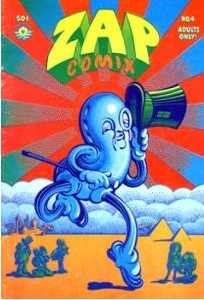
Joshua Dysart: I wanted to be everything when I was growing up. A scientist, a historian, an adventurer and a journalist. A pacifist and a pugilist. I wanted to spend my life in a room with one window looking out at the mountain contemplating the arc of all things, and I wanted to be out on that mountain always doing and living and never being able to see the mountain for being on the face of it. I wanted to always be learning new things. I wanted to love and understand all people. It turned out that there’s only one way to be everything and do everything and always stay a student and openly love and hate and struggle for understanding. And that’s to be a writer. To project yourself into other lives, even if they’re fictional. So I always wrote. From as far back as I can remember I was writing stories. And because comics and movies were such a big part of my life I think I acquired a strong visual eye early on, and that had a deep impact on my writing. During my teens and early twenties I tended towards a style that explored the external aspect of the characters instead of the internal (I have since grown bored with authors who don’t have the chops to reveal inner landscapes), so I was really primed for comics. To talk about my influences in comics would be too much. As there are a great many of them. But I’m a child of the B & W boom of the late 70’s and 80’s. The independents. My mom had stacks of counter culture comics (Zap #1 was the first comic I ever saw) and those were part of it all. I was also a big fan of British comics and the fantasy comic magazines of that era. I never had much use for superheroes, except for when Alan Moore or Frank Miller took a swing at them. But the truth about my involvement with comics is that they actually chose me. I was approached by some friends to write a comic book for them, and after some resistance, I finally acquiesced and got to work. That first published comic ended up being the original B & W Violent Messiahs, which sold horribly but was optioned for a movie. So with that encouragement I packed up my things and moved out to Los Angeles to be with my partners (Jan Utstien and Bill O’Neil) and make more comics. That was in 1998. I’ve been struggling to understand what makes a good comic book ever since.
Cosmo: Outside of comics, are there other art forms (such as film or music) which have influenced your writing?
Dysart: Absolutely. Everything. Everything. Influences are a hard thing to write about. If you keep your eyes and ears open then everything should have some degree of influence on you. Life too. Especially life. Real life is a big influence on my work. When a story feels lifeless, flat, borrowed, it’s because it’s culled together almost entirely from other fictional sources. The creator of that story isn’t looking around them at the world, or looking inside themselves, for something real and human. No matter how high the fantasy, the reader still wants it to be driven by some touch of life and humanity.
Cosmo: This approach, I feel, is very much the heart of your current Harbinger series. Speaking of which, how did you become involved with this revival? What was your experience, if any, with their original 90s incarnation?
Dysart: I’d never read the original Harbinger. The only Valiant stuff I read in the 90s was Archer and Armstrong, because of the great Barry Windsor-Smith. But, as I said, I was never much of a super hero guy. Warren Simons cold-called me when they were setting up the new Valiant line, based in part on him enjoying Unknown Soldier and also because Christos Gage floated a kind word his way about me.
Cosmo: Harbinger is one of the strongest team books out there right now. One of the reasons for this is that it is truly a team book. Peter may be the leader of the Renegades, but every member receives equal time. Each is a distinct individual who, nonetheless, fits naturally within the group. Does this type of ensemble writing appeal to you? Do you consider it any easier or more difficult than composing a story centered on a dominant central character?
Dysart: I think it’s questionable that Peter is the leader of anything, but thank you for the kind words. I love writing character. I love it more than I do cracking the form of the piece, the tone or even the plot (actually, I hate plot . . . story is the least interesting part of stories to me). So creating and realizing people are where my real joy lies. And because of this I do tend towards ensemble writing, but I also think that it lends itself to comics. Having a lot of characters in your work speaks to the vibrancy of narrative that serialized mediums thrive on. Having said that, I’d also love to take a shot at creating a single central character narrative. I’m always in awe when a story never leaves the protagonist’s sphere of observation. It’s very hard to do in pulp fiction, because of all the plotting and counter plotting between villains and heroes, and because of the mandate to show the reader the most visually interesting aspects of your narrative at any given time, whether the protagonist is involved in that moment or not.
Cosmo: On the subject of plotting, each arc of Harbinger has had a sense of progression to it. First you introduced readers to Peter, then gathered companions around him, before launching them off into their first major undertaking (The Harbinger Wars). At each stage you lift the stakes a little higher. The death of a Renegade felt like a very real possibility within The Harbinger Wars, and events tragically claimed one member in last month’s issue. How consciously did you plan out these story beats, and how much did they simply evolve naturally as you told your story? Do you tend to map out your story arcs far in advance?
Dysart: Creating a story is like building a road. I know I’m going to have to build my road across the hard, dense and often jagged terrain of my own imagination. So at first I map the road out. I’d be a fool not to. But then I get out there in the wilderness, in the minutia of it, and very quickly the map gets tossed. Because the truth is, I want to get a little lost. It’s not the most efficient road we’re trying to make. Not the fastest road. We’re trying to make a road that others will want to walk for fun. We want to make a winding road, one with difficulties and great sweeping ascendant views. That’s the road others want to walk and I want to build. And that road most often reveals itself in the doing, not in the planning. So I know my destination, more or less, but I don’t know how the road I’m building will get us there. Sometimes I crest a hill while building the road and get this beautiful vantage point on where I’m going and where I’ve been and that’s when I remap it the best I can. I alter things and throw out reams of story clutter. But other times, most of the time, I’m down in the valleys and swamps of it. Just writing my characters and my moments. Building my road, trying to remember what it all looked like from those high vantage points. And anything can happen down there. Down there the map is useless, the road goes where it must.
Was that too pretentious? I can’t help it. I’m a pretentious dude.

Cosmo: Your sobering use of violence in Harbinger, as well as strong sense of moral ambiguity, is reminiscent of Unknown Soldier. How much overlap do you see amongst your work?
Dysart: It’s obvious to me that all the stories come from the same author, and that this author has perennial fascinations. I spend a lot of time wondering where violence comes from. I’m attracted and repelled by it. I’m amazed by the things we’re willing to fight for. I’m fascinated most when we fight for something that might just be wrong . . . and how that leads to more violence, and so on. It’s hard not to find that in my work, I think. On some level, in regards to Harbinger, I really did want it to subvert superhero comics a little bit but I also wanted it to be mainstream. So that what we had to say would be heard. Unknown Soldier was something else. A different animal. It had a lot to say and it shouted it at you. It was barbed and hard-shelled. It’s true that there were concessions made to commercial viability in Unknown Soldier in the hopes that we could maybe get the Xbox generation to accidentally learn something, but Unknown Soldier is a howl of rage and anger. Harbinger is a little bit more laid back. It doesn’t always go for the reader’s juggler. It’s a softer, goofier touch.
Cosmo: With that in mind, let’s shift over to Unknown Soldier now. How did the revival of this character and your involvement with it come about? If it started with Vertigo, how much of it was already sketched out?
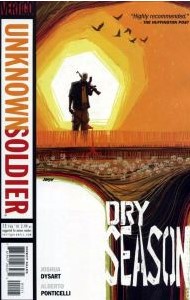
Dysart: None of it was sketched out except for what had been published previously. I and several other writers were approached to pitch our ideas of how we would modernize and revamp the character. My pitch was the one that got picked, which was surprising since I wanted to turn him into a Western educated East African of questionable intention.
Cosmo: And yet, going back to the mid-80s with Alan Moore and Swamp Thing, there is a strong tradition of DC allowing writers to freely re-conceive second-tier characters. Do you see your time with The Unknown Solider as part of this legacy?
Dysart: Yes, I do. In fact I might have been the last of that trend. I’m not sure if DC will ever allow as wild a reinterpretation of one of their characters—as Vertigo became famous for—again.
Cosmo: A key component of any series is the artist, and Alberto Ponticelli fills that role quite well. A great artist, he did some fabulous work on Unknown Soldier. What was it like working with him?
Dysart: It was fantastic. It was one of the very best professional experiences of my career. We were making comics from the heart. Marketing was secondary. We were doing something that hadn’t been done in mainstream American comics and he was our engine. Alberto was fast and amazingly adept at utilizing the reference I had brought back form my research trip without letting it compromise his personal style. He was smart, internationally minded, funny. His characters are people with a wide range of emotions. I often cut dialogue after seeing his art, knowing that the glance he had given a character said more than the words I had written. I love Alberto Ponticelli with all my heart. We met in person once. In New York. But he is my brother, because he gave me a gift. Doing all that work for Unknown Soldier was a gift to me. Anyone who gets to work with him is a lucky creator indeed.
Cosmo: Sera is one of my favorite characters in Unknown Solider, just as Faith is in Harbinger. In fact, Harbinger features a variety of compelling female characters. In general, what are your thoughts on the current state of women in comics?
Dysart: Oof. I’m not sure how to answer that. I don’t mean to judge other people’s work, and I really don’t read enough mainstream superhero comics to have a clear view of the field. But it’s obvious to me that there’s no equity in the exploitative nature of the way male and female characters are posed, costumed and depicted in comics. It’s not an exaggeration to say that if you walk into a comic book store cold and look around, the images of women you’ll be bombarded with don’t seem to be the most complex and diverse representation of femininity. And the sense I get is that for these, and other deep sociological reasons, many women who read comics often feel embattled. And that’s incredibly disheartening to me. Whenever I see a comic book panel that’s designed more to show a woman’s ass than it is to tell the story of the panel, it’s heartbreaking. Because it’s a failure of the imagination on the part of the creators and a failure of quality control on the part of the editor. Suddenly this is a creative team that I have no interest in, because their idea of what’s sexy is misplaced in the moment, and their idea of what’s special and powerful about a woman in general is pedestrian. But also, they just don’t understand the importance of context in the story. And that makes them more than misogynists; that also makes them shitty storytellers.
Of course the sad truth is that almost every woman I know feels embattled out in the world at some level. I don’t know a single woman that wasn’t, at one time in her life, in fear for her physical and psychological self, under the male gaze and grope. As a father of women, as the son of a single mother, as a man who has been made a better person one woman at time of forty years, this terrifies me and pisses me off.
I know this problem in comics is just a tiny part of the six thousand year old systemic machine called Patriarchy. And yet comics is where I live. And hopefully comics is where I can make a difference in my own little way.
Cosmo: Besides continuing with Harbinger, as I hope you will for a while still, do you have any other projects in development? Perhaps another Vertigo series, or some creator-owned work?
Dysart: I’m keeping everything under wraps until I’m ready to talk about it. But thanks for asking!
Cosmo: Again, thank you for taking the time to answer my questions.
Dysart: Thanks for taking the interest!
Harbinger #24 comes out Wednesday, June 18th from Valiant. Unknown Solider is available in trade from Vertigo. Both series are highly recommended.





